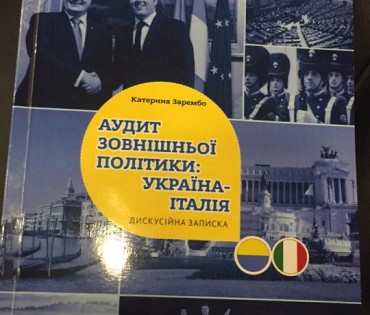The discussion paper was prepared by Kateryna Zarembo, Deputy Director, Institute of World Policy.To download the full report click here.
INTRODUCTION
Ukraine and Italy have never been among the top foreign policy priorities for each other. Italy has traditionally been focused on the Mediterranean region, and Russia remains its strategic partner in Eastern Europe. Before the Revolution of Dignity and the Russian-Ukrainian conflict, Italy’s key interests towards Ukraine were associated with trade and investments.
As for Ukraine, it has traditionally been interested primarily in the economic dimension and achieving Italian support..
Since the beginning of the Russian-Ukrainian war, Ukrainian-Italian relations have been affected by an additional aspect. The traditional economic partnership was supplemented by the security policy issue over which Italy had a problem in its relations with Russia. Therefore, official Rome is now primarily interested in stabilizing the situation in Ukraine.
At the same time, Italy does not share the Cold War discourse of isolating Moscow and maintains a pragmatic attitude to the situation Russia will remain a powerful player at the regional and global level and needs to be taken into account. Many Italian politicians continue to believe it necessary to revert to Italy’s experience when Italy had perhaps the best relations with Russia among all Western countries at the peak of the Cold War while being a NATO member and a U.S. ally in Europe. Meanwhile, owing to a number of factors (change of governments in Italy and Ukraine, Russian aggression in Ukraine) the Italian-Ukrainian relations gained a new dynamic. The objective of the Ukrainian government at this stage is to support the dynamics and transformation of political agreements into specific mutually interesting economic projects.
Nowadays, both sides see each other as “connecting links”. For Ukraine, Italian support at the international level, including the EU, NATO and the G7, is vital. Italy considers Ukraine in context with Russia as a country that theoretically could influence internal development of Russia, link it with the EU, or at least act as a “bridge” (approach presented by Romano Prodi several years ago) giving the EU a safe distance for continuing dialogue with Russia. At the same time Italy is only beginning to discover Ukraine as a full partner.
The strategic priorities of Ukraine towards Italy are as follows:
1) development of a separate bilateral political track, supported by the mutual realization of inherent worth by both partners;
2) Italian support of Ukraine’s European integration aspirations;
3) Italian support of cohesion in the EU regarding the territorial integrity of Ukraine in the context of resolving the Russian-Ukrainian conflict in eastern Ukraine and de-occupation of Crimea;
4) implementation of interests in the energy sector in order to maintain Ukraine’s role as a European energy hub;
5) realization of the interests of the Ukrainian community in Italy;
6) changing the Italian “mental map” of Ukraine; dispelling the myth, deeply entrenched in Italian mentality, about Ukraine’s political and cultural affiliation to the “Russian World”.
The implementation of these interests has great potential, as the interests of Italy towards Ukraine are as follows:
1) increasing the amount of Italian companies and investments in Ukrainian market;
2) restoration of the territorial integrity of Ukraine and resolving the conflict in eastern Ukraine;
3) preservation and development of gas transport routes across southern Europe, where Ukraine has a key role due to its geographical location.
The objective of this paper is to identify the intersection points of mutual interests for Ukraine and Italy and possible ways of their effective implementation.
To download the full report click here.
The research was prepared within the IWP’s project “New European Policy: Filling the Awareness Gap”. This project is carried out within the National Initiatives to Enhance Reforms (UNITER) project, supported by the U.S. Agency for International Development (USAID) and implemented by the Pact in Ukraine. The IWP also would like to thank the Black Sea Trust for regional cooperation – a project of the German Marshall Fund.




Comments theme
Comments themeComments themeComments themeComments themeComments themeComments themeComments themeComments themeComments themeComments themeComments themeComments themeComments themeComments themeComments themeComments themeComments themeComments themeComments themeComments.